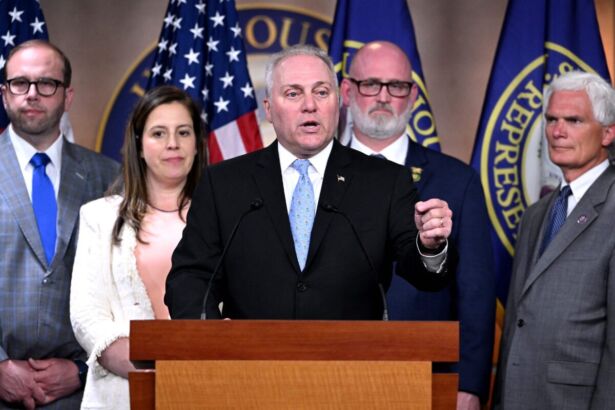The U.S. House of Representatives passed bipartisan legislation to suspend the nation’s debt limit through Jan. 1, 2025, despite vocal opposition on both sides of the aisle.
The Fiscal Responsibility Act, a fiscal package put together by President Joe Biden, House Speaker Kevin McCarthy (R-Calif.), and their teams of negotiators, overwhelmingly cleared the lower chamber with a 314-117 vote.
More Democrats voted for the bill than Republicans by a margin of 165 to 149. Of those opposing the package, 71 members were from the GOP caucus and 46 were from the Democrats.
McCarthy championed the bill on the House floor on May 31, telling fellow lawmakers that this “is a crucial first step for putting America back on track.”
“It does what is responsible for our children, what is possible in divided government, and what is required by our principles and promises,” he added. “Yes, it may not include everything we need to do, but it is absolutely what we need to do right now.”
House Majority Leader Steve Scalise (R-La.) echoed McCarthy’s sentiment, telling reporters at a news conference after the vote that this is just the beginning of restoring fiscal responsibility in Washington after the vote.

“This is the first step. This is a down payment on the other things that we’re going to start doing,” Scalise said. “But none of those things would be possible if we didn’t start tonight with the action that was taken by this House in this majority.”
Rep. Patrick McHenry (R-N.C.), the House Financial Services Committee Chairman, called it “the most conservative spending package during my time in Congress.”
“The Fiscal Responsibility Act is the largest deficit-reduction bill in at least a decade and will fundamentally change the spending trajectory in Washington,” he stated.
Headed to the Senate
The package now heads to the Senate ahead of a June 5 deadline. Senate Majority Leader Chuck Schumer (D-N.Y.) plans to initiate the debt ceiling bill process on June 1. However, it could still take several days to travel through the Senate, depending on the senators and their positions on the matter.
“There’s been a very good vote in the House. I hope we can move the bill quickly here in the Senate and bring it to the president’s desk as soon as possible,” Schumer said.
Biden urged the upper chamber “to pass it as quickly as possible” to prevent a default and keep the nation’s economic recovery intact.
“This agreement is good news for the American people and the American economy,” he said in a statement.
Several senators have expressed disappointment and revealed they intend to vote against the Biden-McCarthy bill.
Speaking on the Senate floor on May 31, Sen. Mike Lee (R-Utah) called it a “fake response to burdensome debt” and confirmed that he “will emphatically vote ‘No.’”
“One cannot help be seized by a sense of awful foreboding,” the senator said. “Instead of confronting this existential threat head-on, this deal is wracked with complacency and false cowardly compromise.”
Sen. Bernie Sanders (I-Vt.) announced on Twitter that he could not vote for the bill, citing adjustments to federal aid programs and the fast-tracking of the Mountain Valley natural gas pipeline.
“The fact of the matter is that this bill is totally unnecessary,” he wrote. “The president has the authority and the ability to eliminate the debt ceiling today by invoking the 14th Amendment.”
In a “conservative alternative” to the Biden-McCarthy plan, Sen. Rand Paul (R-Ky.) suggested only raising the debt limit by $500 billion and forcing both sides to return to the negotiating table to advance spending reforms. Additionally, Paul projects his proposal would balance the budget by the fiscal year 2028 if the federal government adhered to his suggested caps.
“Sixty percent of Americans say Congress should only raise the nation’s debt ceiling if it cuts spending at the same time. I would guess the Americans answering that poll meant real cuts in spending, not an annual increase of one percent above already bloated levels of COVID-19 spending,” Paul said in a statement on May 30.
Still, political observers say the Biden-McCarthy bill is widely expected to pass.
Markets
The leading U.S. stock market indexes were relatively flat in overnight trading.
Treasury yields were mostly up across the board in after-hours trading as the odds of House passage appeared high. The benchmark 10-year yield rose more than 3 basis points to nearly 3.67 percent. The 1-month bill added 11 basis points to just below 5.32 percent, while the 6-month bill surged 6.1 basis points to 3.525 percent.
Economists, market analysts, and government officials warned of the economic consequences of the U.S. government defaulting on its debt, listing a sharp recession, higher interest rates, and millions of lost jobs as some of the ramifications.
Last week, Treasury Secretary Janet Yellen raised the debt limit deadline to June 5, noting in a letter to McCarthy that the Department would “have insufficient resources to satisfy the government’s obligations” without suspending or increasing the debt limit.
According to the Daily Treasury Statement, the Treasury’s closing cash balance fell below $38 billion on May 30.
Analysts say that investors will now concentrate on the June Federal Reserve policy meeting. It remains uncertain if the Federal Open Market Committee (FOMC) will vote to raise interest rates by 25 basis points or hit the pause button.
From The Epoch Times
